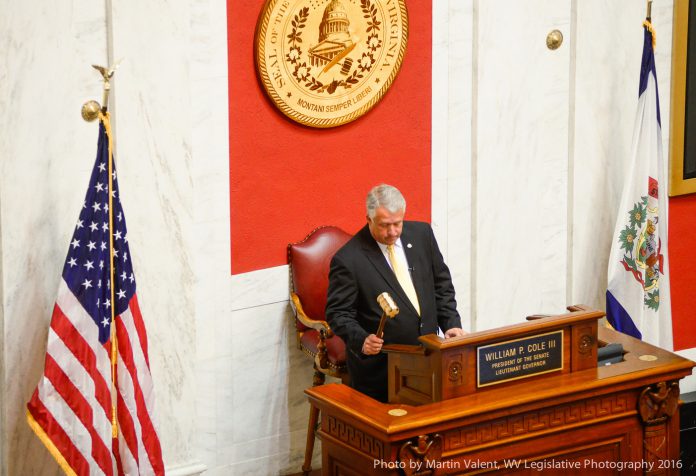As of 4 p.m., Friday, February 5, 2016, the 24th day of the second sessions of the 82nd Legislature, 530 bills have been introduced in the Senate. Of those, 21 of the bills have passed and have been sent to the House for further consideration. Among those:
Senate Bill 15 would adopt learned intermediary doctrine as defense to civil action due to inadequate warnings or instructions. A manufacturer or seller of a prescription drug or device may not be held liable in a product liability action for a claim based upon inadequate warning or instructions unless it proves a specific set of elements.
Senate Bill 27 would permit county commissions hire outside attorneys for collection of taxes through courts.
Senate Bill 40 would be able to change the definition of facilities eligible for funding assistance from Courthouse Facilities Improvement Authority. It adds buildings or structures that will be occupied upon renovation to the definition of “courthouse facility.”
Senate Bill 109 would repeal code provisions related to certain reports by trustees for property.
Senate Bill 123 would provide treatment for sexually transmitted diseases. A health care professional who makes a clinical diagnosis of a sexually transmitted disease may provide expedited partner therapy for the treatment of the sexually transmitted disease.
Senate Bill 150 would authorize the Department of Transportation promulgate legislative rules.
Senate Bill 254 would not allow county park commissions to prohibit firearms in facilities.
Senate Bill 261 would bring state code relating to daylight saving time in conformity with Federal code.
Senate Bill 268 would abolish the Council of Finance and Administration.
Senate Bill 271 would conform the definition of attest services to Uniform Accountancy Act.
Senate Bill 288 would create one-day special license for charitable events to sell non-intoxicating beer.
Senate Bill 306 would permit the sale of county or district property online.
Senate Bill 329 would eliminate sunset provision for commission to study residential placement of children.
Senate Bill 333 would deal with the taking and registering of wildlife. It would be unlawful to take, obtain, purchase, possess or maintain in captivity any live wildlife, wild animals, wild birds, game or fur-bearing animals.
Senate Bill 334 would identify coyote as fur-bearing animal and woodchuck as game animals.
Senate Bill 336 relates to crossbow hunting.
Senate Bill 338 would compile and maintain Central State Mental Health Registry.
Senate Bill 343 would authorize prosecuting attorneys designate law enforcement officers and investigators as custodians of records.
Senate Bill 369 would reduce legislative education reporting requirements. Annual recommendations and reporting the findings would no longer be required.
Senate Bill 379 relates to candidate filing fees. Candidates would pay the fee to an election official instead of the clerk of the county commission.
Senate Bill 387 would create shared animal ownership agreements to consume raw milk. It would permit a responsible party to acquire a percentage ownership interest to consume raw milk.
Additional Senate Bills
Senate Bill 6 would require drug screening and testing of applicants for TANF (Temporary Assistance for Needy Families).
Senate Bill 21 would allow certain sales of alcohol at 10 a.m. Sundays. Retail licenses may sell liquor between 10 a.m. and midnight on Sundays for example.
Senate Bill 24 would repeal the code relating to mandatory motor vehicle inspections. Repealing the sections of the code would make it legal to operate and drive a motor vehicle without an inspection.
Senate Bill 28 relates to county commission and municipality agreements in demolishing buildings unfit for habitation.
Senate Bill 35 would adopt federal definition for disabled veterans’ preference eligibility for civil service jobs and vendor contracts.
Senate Bill 42 would permit school nurses to possess and administer opioid antagonists on or near school premises.
Senate Bill 59 would provide discount to West Virginia National Guard and Reserve members for state park campground rental fees.
Senate Bill 122 would make it permissible to carry firearms in state parks, state forests, recreation areas in state wildlife management areas and state trails managed by the Division of Natural Resources. They may carry for self-defense or defense of others.
Senate Bill 125 would increase the tax on cigarettes to fund substance abuse and workforce development initiatives. Starting July 2016, the tax would increase to $1.05. By July 2018, the tax would be $1.55.
Senate Bill 127 would give rights to grandparents in child custody cases. A grant of visitation can be provided to a grandparent when they have been a significant or primary caretaker of the child for over one year. Greater importance shall be placed on that factor in the court.
Senate Bill 298 would allow restaurants, private clubs and wineries sell alcoholic beverages on Sundays.
Senate Bill 303 would provide all hunting and fishing licenses are valid for one year from date of issue.
Senate Bill 315 would construct a statewide, fiber optic broadband infrastructure network. The 2,500 miles of fiber would reach to each county in the state to bring high speed internet to more rural areas.
Senate Bill 324 would allow transportation network companies to operate in West Virginia. The companies would a digital network to connect transportation network company riders to transportation network company drivers who provide prearranged rides.
Senate Bill 327 would construct a modern highway from Pikeville, Kentucky to Beckley, West Virginia. The project’s initiative is aimed at revitalizing areas that have experienced high rates of unemployment in recent years.
Senate Bill 361 would prohibit any persons who have committed crimes against elderly from performing community service involving elderly.
Senate Bill 367 would prohibit sex offenders from living within 1,000 feet of a school. It would be required of all sex offenders, both on supervised and unsupervised release.

